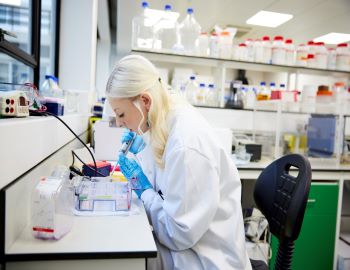
Cystic fibrosis (CF) is an incurable life-limiting, genetic condition affecting over 10,000 people in the UK. The condition causes thick, sticky mucus to build up in the lungs, which can cause serious and difficult to treat infections.
Over the last 50 years antibiotics have contributed to increases in how long people with CF live for.
In 1970 the average survival for children born with cystic fibrosis was below 20 years old. For a child born with CF today, the average predicted age of survival is 50.
Access to effective antimicrobial drugs has made a significant contribution to people with CF living longer. However, CF lung infections are becoming increasingly hard to treat as the bugs that cause them are becoming resistant to the antimicrobial drugs available.
Many of the existing antibiotics now don’t work as well due to antimicrobial resistance (AMR) and new antimicrobial medicines, such as antibiotics, are urgently needed.
Generously supported by AJN Steelstock, the Cystic Fibrosis Trust is funding world-leading research at the University of Cambridge to develop new medicines that beat AMR and better treat CF infections.
The aim of a new antibiotic is to prevent bacteria from growing and surviving. The medicines work by obstructing a chemical reaction in bacteria. The more accurately a medicine obstructs the reaction (fits), the better a medicine it is likely to be.
Researchers at the UK CF Innovation Hub at the University of Cambridge are successfully using a pioneering technique called fragment-based drug design (FBDD) to design new medicines to treat CF lung infections. FBDD is like having a bespoke pair of shoes made, rather than trying on every shoe from every shop looking for a well-fitting pair.
New, more effective antimicrobial medicines are urgently needed for a range of other medical conditions. In addition to AJN Steelstock supporting research that could lead to longer fuller lives for people with cystic fibrosis, this research could benefit many more people with other conditions around the world.



























































































